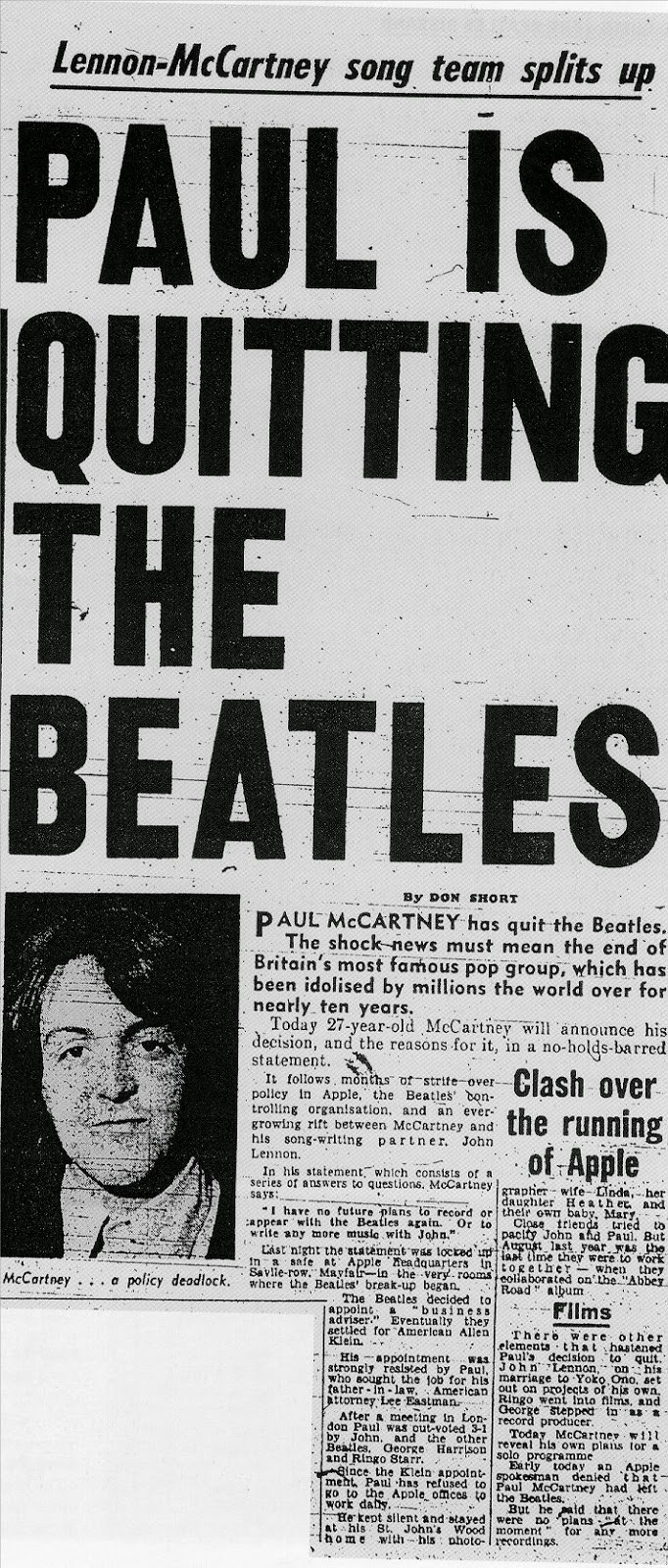On April 10,1970 newspapers across the world carried a headline that was hard to fathom : "Paul Quits The Beatles." The news rocked the world like an atom bomb. And like a bomb, it left many strewn in it's wake. How could it be? What caused it? It must be Yoko Ono, many people believed. In all honesty, it was a combination of factors dating back to at least 1966. That was the year of " The Beatles are bigger that Jesus ", those infamous remarks by John Lennon that turned a lot of America and the entire southern Bible-belt against the group. 1966 would be the last time the group would perform in an organized tour. In 1967 their manager Brian Epstein died of a drug overdose { whether deliberate or accidental has never been convincingly determined. } 1968 brought more bad news : John's divorce from wife Cynthia and the advent of Yoko Ono. Also Ringo briefly walked during the "
White Album" sessions, with Paul manning the drums in his absence. Their assuming of the business matters of their new record label Apple Corp, best left to professionals, also had an impact. 1969 brought more changes with a cast that included new manager Allen Klein { bad } and old friend and keyboardist Billy Preston { good } the second member to briefly leave during the
Let It Be documentary they were filming, only to be coaxed back, and John announcing {privately to the other Beatles} in September, that not only was he leaving the group, but that he was Jesus Christ. After a few years like that the group's dynamic was all but wasted. Paul, who had assumed the motivational role of idea man - " come on lads, we gotta do something, let's try this " - had become a frightened, angry and depressed man, pouring his feelings into songs like
Let It Be,
The Long and Winding Road, You Never Give Me Your Money, etc. Paul was frightened because of John's sudden re-emergence from his epic acid intake of 1966-1967 - like a patient coming out of a two year coma -
suddenly offering biting comments on all and everything around him, much like the John of old who had been AWOL the previous two years. This, along with Yoko's influence over him, pretty much rendered Paul and the others useless in John's eyes. Paul's anger stemmed from him not being listened to nor taken very seriously by the others when he would offer a new idea for the group to work on { for better or worse McCartney initiated the
Magical Mystery Tour BBC film, and the
Let It Be film and concert - originally titled
Get Back, in an effort to get back to their roots musically and personally after the
White Album sessions - which never properly took flight due to the apathy of the other three }. Without Paul's cajoling, it's quite possible the band would have broken up after Epstein's death in August 1967. Finally, Paul was depressed because he, at this point, was
the only one trying to advance the group. He had given his all to The Beatles, to keep the band together, only to be ridiculed by his best mates, who he was on the verge of losing, two of whom he had known since the tender age of 15. So on April 10, 1970 it was Paul McCartney's turn to defect. The big difference between Paul's departure and John, George or Ringo's is Paul went public.
Feeling under-appreciated, Paul had just completed his first solo album
McCartney, that he had been working on from late 1969 to early 1970, between bouts of depression. It was his baby and he wanted to release it on April 17th. The other three felt it would compete with the
Let It Be soundtrack album { a record no one in the group particularly cared for }, recorded in January 1969, but not scheduled to see the light of day until May 1970. Up to now Ringo had made a solo album and John had made several albums and singles {
Give Peace A Chance,
Cold Turkey}. George's maiden solo effort,
All Things Must Pass, wouldn't come along until November 1970. The others Beatles were really pissed off at Paul for his grand gesture, John especially. In the fierce competition between the two, Paul's walking out was the single stroke that John couldn't abide. John had started the group and felt, probably rightly, that he should be the one to end it. Paul's leaving was the one thing John couldn't control and it stole his thunder. So with on fell swoop, The Beatles were no more. In a way, Paul may have done us a big favor; the band couldn't have gone on forever, and it is quite possible the magical quality of their music may have faded as the 60's gave way to the 70's and beyond.
For the record,
McCartney was pretty much blasted by the critics of the day for it's low-key approach and it's several half baked songs. His former mates also checked in with some comments. George said he liked Paul's now-classic
Maybe I'm Amazed, but felt the rest of the album was lacking. John was even more direct calling the solo effort " rubbish ". Because of Paul's announcement of the break up of the world's biggest band, he took a lot of hits and backhanded swipes from press and public alike, however the album went to #1 for three weeks on Billboards Top 200 ; it would eventually go double platinum. I have always liked the record, even while acknowledging it's shortcomings. If you haven't listened to it for awhile pop it in the queue of your iPhone, it contains many pleasures, some of which may have been overlooked in 1970 and forgotten with the passing of the years.






